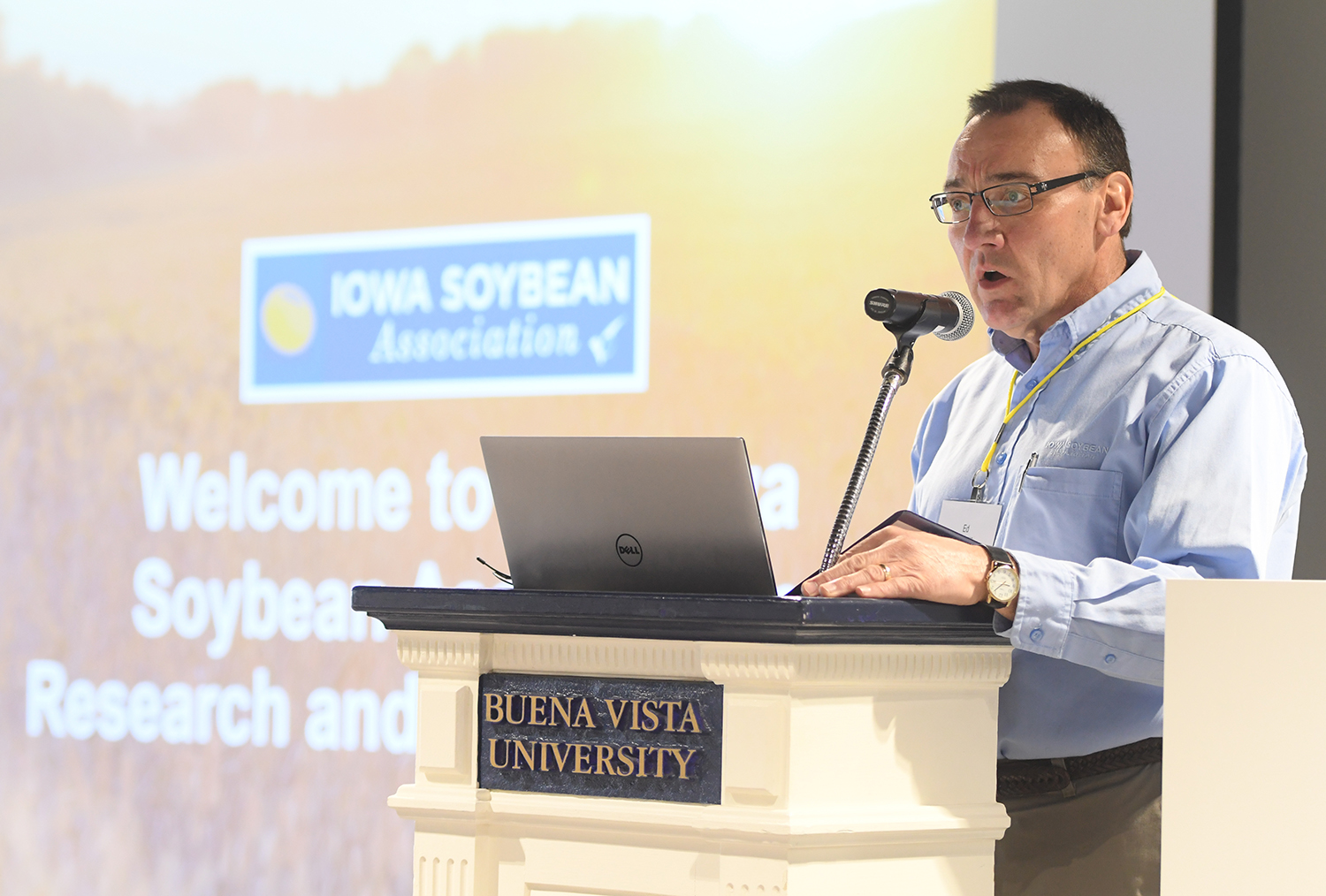
Ed Anderson presents valuable research information during the Research and Results Forum in Storm Lake. The Research Center for Farming Innovation will be hosting information webinars on March 9 and 11. (Photo: Joseph L. Murphy/Iowa Soybean Association)
Productive, profitable farming in 2021
March 4, 2021
by Darcy Maulsby, an ISA Communications contributor
3 reasons you don’t want to miss ISA's March webinars
When AJ Blair thought about reducing the number of nitrogen application passes across his acres, he had one big question. How would this impact his no-till corn yields?
He worked with Scott Nelson with the Iowa Soybean Association (ISA) on a trial to study the benefits of broadcasting AMS on top of no-till corn at planting. “When you consider any management change, you must look at all of the variables, from inputs to time to costs,” said Blair, who farms near Dayton with his wife, Kellie.
After Nelson helped Blair set up strip trials, it was easy to see a difference. “Visuals don’t always equal success, though,” Blair noted. “We wanted yield data.”
The numbers revealed a 7- to 10-bushel-per-acre yield boost in the areas with earlier-broadcast fertilizer. Blair, who plans to conduct more trials this year, will share more about this research during one of ISA’s upcoming Innovation To Go! webinars.
ISA’s Research Center for Farming Innovation (RCFI) is hosting two free webinars on March 9 and March 11 from 8 a.m. to 9 a.m. The webinars will feature ISA staff and RCFI farmer-partners, including Blair on March 11.
“These webinars give you an inside look at how participating in ISA’s on-farm research projects can benefit your farm,” said Ed Anderson, PhD, senior director of research at ISA.
Here’s what you can expect when you sign up at iasoybeans.com for these free webinars:
Webinar 1: Tuesday, March 9, 8 a.m. - 9 a.m.
This webinar is geared to farmers who haven’t worked with RCFI before. “We want to give you some general information before digging into the details and data,” Anderson said. Topics will include regional research priorities, 2020 research results and ways to get involved in on-farm research in 2021.
Webinar 2: Thursday, March 11, 8 a.m - 9 a.m.
This is geared towards farmers who are already working with RCFI. “We’ll take a deeper dive into recent research related to nutrient and cover crop management, and other in-field and edge-of-field practices, products and infrastructure” Anderson said. “We’ll also discuss how taking a holistic cropping-systems approach leads to increased productivity and profitability.”
What’s in it for you?
If you’ve heard about 4R nutrient stewardship (right fertilizer source at the right rate at the right time in the right place), think of the RCFI’s webinars as a 3R system of research, relevance and relationships.
1. Research.
If you’re looking for unbiased, scientifically-sound, statistically robust data focused on agronomy and conservation, RCFI’s webinars are a good place to start. “We’re don’t sell products,” Anderson said. “We’re here to help farmers in a truly unbiased way.”
2. Relevance.
ISA’s farmer-focused research goes back nearly 20 years. “Our farmer-directors felt that universities and private companies weren’t filling the full spectrum of farm research needs,” Anderson said. “That inspired ISA to form the On-Farm Network and Environmental Programs & Services team, which are now known as RCFI.”
Relying on ISA's analytics experts, this is the largest internal research group of any ag commodity organization, Anderson noted. “Farmers are our only focus. Our goal is to help you become more productive and profitable in sustainable ways.”
3. Relationships.
While RCFI used to host a single meeting once a year to share research results, this is changing in 2021. “It’s exciting to create a continuing education effort instead of a ‘one-and-done’ approach,” Anderson said. “The March webinars will kick off a year-long series of stories, reports, additional webinars and more.”
All this helps more farmers connect with RCFI. In the future, the RCFI team hopes to continue with various webinars, farmer-focused communications, and get back to a large in-person event.
“While we’ve hosted regional research forums in the past, the feedback we received was clear,” Anderson said. “Farmers want to get together and hear from other farmers around the state, so they can dig into the issues that impact them. Until we can meet again in person, the March webinars are a great place to start.”
REGISTER NOW
Back